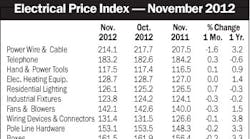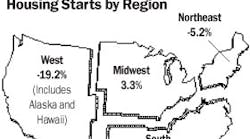The stagnant economy, the dot-com bust and the terrorist attacks all wreacked havoc on New York City's construction market.
“It's slow,” said Bob Mann, chairman of E-J Electric. “The general contractors are trying to find work, and so is everybody else. Projects aren't really going ahead as planned and the major corporations aren't taking space in the office buildings.”
Although lower Manhattan lost 11 million square feet of office space when the Twin Towers collapsed, other buildings became available when the dot-coms went out of business.
“The people who decided they wanted to stay in New York could move into a lot of office space that had just been renovated for these dot-coms,” said Jim Usher, vice president of communications for E-J Electric Installation Co., Long Island City, N.Y. “The dot-coms were only in the space for a year or two, spent big bucks fixing up their offices and basically went out of business and walked out the door.”
The increased availability of pristine office space has hurt the interior construction market, he said.
“People were able to move in and they didn't have to do anything,” he said. “It was all brand new and renovated office space. With all the huge layoffs and the dot-com bubble bursting, a lot of office space is now available.”
Construction has slowed down in New York City, partly because companies are waiting for the government to approve an insurance program for future terrorist attacks. The major insurance companies don't want to face horrendous losses in case of another terrorist attack. At the same time, construction lenders, banks and finance companies are hesitant to finance a company that doesn't have insurance on a project.
“It has gone back and forth in Washington, and it still hasn't been firmed up,” Mann said. “Everyone in the construction and real estate industry has been lobbying terrifically to get this thing through and moving, but so far it hasn't been finalized.”
Usher said insurance rates for construction companies have gone through the roof.
“It's not a question anymore of getting three bids,” he said. “It's like you're out begging the insurance carriers to take you and then you're getting whacked 200 percent, 300 percent or 400 percent increases. It has been horrible. It's a huge problem here in New York.”
Almost one year after Sept. 11, Mann said New York City is not the same.
“It was horrendous,” he said. “It has impacted New York terrifically as far as knocking the economy down and creating a lot of the hesitancy on where people are going to have their offices and whether there is ever going to be another attack. I hope that it will be rebuilt, Lower Manhattan will have a better transportation system and companies will again go down there and be tenants.”

